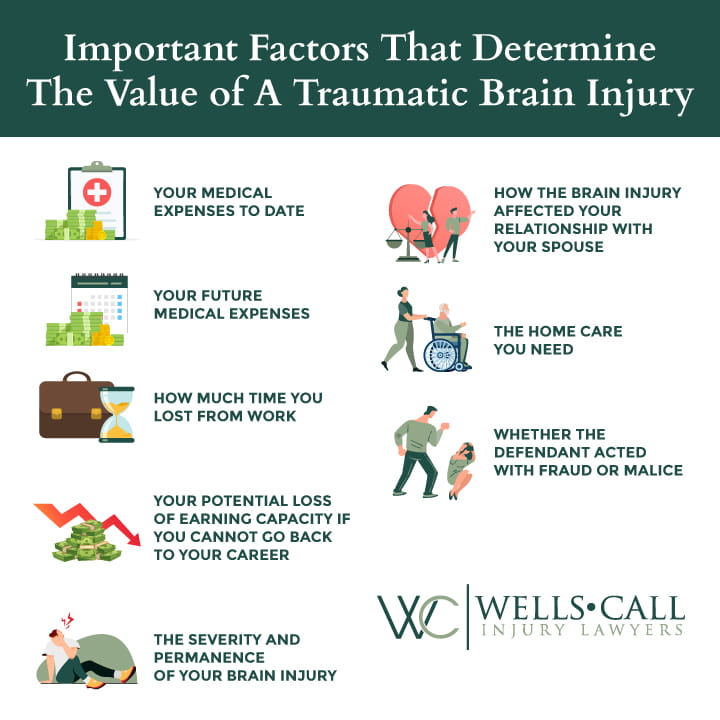Traumatic brain injuries, also known as TBIs, are brain injuries that are caused by physical force.
Car accidents, slip and falls, and other types of accidents can lead to traumatic brain injuries.
If someone else’s actions caused your traumatic brain injury, you could have the right to pursue a claim for your damages.
Understandably, prospective clients want to know, What is the value of a traumatic brain injury in California?
To learn more about the potential value of your case, speak with one of our skilled California personal injury lawyers.
At Wells Call, we have over three decades of experience helping clients just like you recover financial compensation for their injuries.
We understand how scary a traumatic brain injury can be and the fears you can face about paying for future treatment.
Let us help you fight for the compensation you deserve.
What Is the Value of a Traumatic Brain or Head Injury in California?
Like other types of personal injury claims, the value of a traumatic brain or head injury claim in California will vary between victims.
There is no average settlement amount because no two claims are exactly alike.
Someone who suffers a catastrophic brain injury will have a higher claim value than someone who had a minor concussion with no lasting side effects.


The compensation you receive for a traumatic brain injury claim can also vary depending on whether you share any responsibility for the accident. If so, your payment amount will be reduced by your percentage of fault.
California is what’s known as a pure comparative negligence state.
That means that even if you are mostly at fault for the accident, you could still recover some money for your injuries.
For example, if a jury finds you 20% at fault, you will receive 80% of the award. If the jury finds you 85% at fault, you will receive 15%.
Traumatic Brain Injury Statistics
According to the Centers for Disease Control and Prevention (CDC), almost three million people seek emergency treatment for traumatic brain injuries every year.
These numbers have been increasing every year, which is concerning as at least 50,000 people die from brain injuries each year.
While many brain injuries are relatively mild and victims make a full recovery, traumatic brain injuries contribute to a third of all injury-related deaths across the country.
Causes of Traumatic Brain Injuries
Numerous injuries and traumatic events can lead to a brain injury.
The severity of your damages will depend on the nature of your injury and how much force was involved. Some of the most common causes of traumatic brain injuries include the following events:
- Automotive collisions—accidents involving cars, trucks, motorcycles, bicycles, or even pedestrians can result in a brain injury, especially if your head hits against something in the vehicle;
- Falls—falling from a ladder, a bed, or a set of stairs are a few common causes of traumatic brain injuries, especially in children and the elderly;
- Sports injuries—athletes are at a high risk for traumatic brain injuries, especially in contact sports like boxing, hockey, football, soccer, etc.;
- Violence—violent acts, such as assault, a gunshot to the head, domestic violence, or child abuse such as shaken baby syndrome, can also lead to brain injuries; and
- Combat injuries—active-duty military members can receive a brain injury from explosive blasts or other assaults, especially those involving penetrating head wounds.
Certain age groups are at greater risk for traumatic brain injury, especially children under four, young adults between 15 and 24, and older adults 60 and over.
Traumatic Brain Injury Symptoms
Symptoms of a traumatic brain injury will vary depending on the severity of your injuries.
For mild traumatic brain injuries, symptoms can include:
- Loss of consciousness ranging from several seconds to a couple of minutes;
- No loss of consciousness but feeling confused, dizzy, or disoriented;
- Nausea or vomiting;
- One or more headaches;
- Sleeping more than usual or difficulty sleeping;
- Drowsiness or fatigue;
- Loss of balance or dizziness;
- Sensitivity to sound or light;
- Sensory problems, such as ringing in the ears, blurred vision, etc.;
- Feeling anxious or depressed;
- Concentration or memory problems; and
- Mood swings or other mood changes.
Symptoms in moderate to severe traumatic brain injuries can include:
- Loss of consciousness that lasts more than several minutes;
- Repeated episodes of nausea or vomiting;
- Recurring headaches or one that keeps getting worse;
- Inability to wake up from sleep;
- Seizures or convulsions;
- Numbness or weakness in toes and fingers;
- Clear fluids draining from ears or nose;
- Problems with coordination;
- Slurred speech;
- Significant confusion;
- Unusual behavior like agitation or sudden combativeness; and
- Coma or any other consciousness disorders.
You may notice some of these symptoms in your child after suffering a brain injury. They may not be able to communicate their symptoms, so observing them closely after an injury is important. Watch for changes in your child’s behavior, such as losing interest in their toys, suddenly not eating or nursing, etc.
Types of Damages You Can Recover in a Traumatic Brain Injury Claim
If you bring a successful traumatic brain injury claim, you could be awarded several different compensation types. Depending on the circumstances of your case, you could receive money for your:
- Economic damages—quantifiable damages, such as your medical expenses and lost wages; and
- Non-economic damages—damages that are more subjective and not measured objectively, including compensation for your physical pain and suffering, emotional distress, or a loss of companionship.
In limited cases, you could receive compensation for punitive damages, which are designed to “punish” the defendant and discourage them from acting in the same way again. The court will award punitive damages only in cases where the defendant acted in a manner that is considered egregious, such as driving under the influence of alcohol or drugs or drag racing.
Options for Obtaining Compensation
Victims usually receive compensation in one of two ways.
The first method involves a settlement with the at-fault party’s insurance company. It’s not uncommon for negotiations to take place right up until trial.
A settlement is when you and the defendant’s insurance company reach an agreement on how much they are willing to pay for your brain injury. If you are unable to resolve your case through negotiations, it will likely go to trial.
Most injury claims resolve through settlement negotiations, but some do end up going to trial.
The second way to receive compensation is through a verdict.
Usually, a jury hears your case and decides whether you deserve any compensation and how much.
They will also determine what percentage of fault you had, impacting how much of the award you will receive.
How a California Personal Injury Lawyer Can Help with Your Traumatic Brain Injury Claim
If you are wondering whether you need a lawyer to assist with your traumatic brain injury claim, the answer is almost always yes.
Unless your injury was very minor or you have already negotiated a fair offer from the insurance company, you may not benefit from a personal injury attorney. In most cases, insurance companies are not likely to settle for a fair amount as brain injury claims are typically worth a lot.
Insurance companies will take advantage of the fact that you don’t have any legal or negotiating experience. They may argue that your brain injury isn’t that severe, or they will try to assign a high percentage of liability to you. An experienced California personal injury lawyer will make sure the insurance company is not mistreating you.
Your claim may require numerous experts who can testify that your injury was consistent with the facts of the accident and that your treatment was reasonable and necessary.
The at-fault party’s insurance will be looking for any way to reduce the payout.
By claiming that your brain injury wasn’t that severe or that your full treatment wasn’t necessary, they can save their company money.
Hiring the right experts is crucial, which is why you need a skilled legal advocate on your side.
You have a limited amount of time to file a lawsuit in a personal injury claim.
In most cases, you have only two years from the date of the accident to file.
If you miss that deadline, the court can throw your claim out, and the at-fault party doesn’t have to pay you—even if there was an offer on the table.
Your attorney will make sure all claim deadlines are met and that your case is timely filed.
Contact a California Personal Injury Lawyer Today
If you suffered a traumatic brain injury in California due to someone else’s negligence or intentional actions, you deserve to be compensated for your damages.
A skilled California personal injury attorney can fight for the compensation you are owed.
At Wells Call Injury Lawyers, we have the necessary experience and the skills to help you get the maximum compensation possible.
Since 1984, we’ve recovered more than half a billion dollars for our clients.
Contact us today to schedule an initial consultation to learn more about how we can help.
We have offices conveniently located in Fairfield, Napa, Richmond, Vallejo, Woodland, and Vacaville. Meet with one of our seasoned attorneys to learn what your traumatic brain injury claim is worth.
